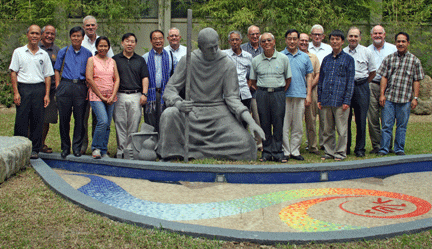A new Conference Formation Delegate, better cooperation on theology and philosophy, regional planning and management, and other concerns kept the major superiors occupied last January 26–29 in Manila.
Jesuit formation and apostolic planning were high on the list for the thirteen JCEAO (Jesuit Conference of East Asia and Oceania) major superiors who met in Manila, as guests of the Philippine Province, in the last week of January. The Conference, which meets every six months, is represented by the major superiors of seven provinces and six regions or missions, and covers over fifteen countries.
"This was our second meeting since Fr Nicolás, our former President, was elected General," said the new JCEAO President Fr Mark Raper (ASL). "The emphasis GC35 gives to conferences in the Society’s governance is now tangible. We experience ready cooperation at many levels across our Asia Pacific region and beyond. Provinces are generous in contributing personnel and support for common projects." Fr Raper said.
Sch Karel San Juan (PHI), assisted the superiors to identify regional needs and challenges. The Conference confirmed that Jesuit formation, planning for the smaller missions and regions, and new models of communication and cooperation deserve early attention.
Demonstrating the importance given to Jesuit formation, the Conference appointed a new Delegate for Formation, Fr Matthias Chae (KOR). The provincials accepted that the whole conference must cooperate in preparation of Jesuits for ministry in ways best suited to our mission, time and both our international and local contexts.
A working group was set up to develop better cooperation among the nine Asian schools for philosophy and theology. The Conference reinforced its commitment to the International Theology Program based in the Loyola School of Theology, Manila.
Two new members were welcomed to the Conference: John Sin Won-sik, the new Korean Provincial who was formerly novice master, and John Hagileiram, until now a parish priest in Yap, who will soon take up the role of Regional Superior for Micronesia. We farewelled John’s predecessor, the Very Reverend Fr Ken Hezel.
Fr Danny Huang (PHI), our new General’s Assistant contributed helpfully to the deliberations, giving news of Fr Nicolás and of developments in the Curia, the team of the General and the worldwide Society.
Significant time was given to Jesuit formation. The needs are most dramatic in regions that do not yet have personnel, institutions or funds dedicated to this task. Over the last three years the number of novices across Asia Pacific has risen from 76 in 2007 to 111 in 2009. The increases are mostly in Vietnam, Myanmar, Thailand, East Timor and China.
The new JCEAO Formation Delegate, Fr Matthias Chae Joon-ho, 54 years, who has a doctorate in pastoral counselling, was until recently Provincial of Korea, and before that the Formation Delegate in Korea. Of the six Jesuit conferences world-wide, JCEAO was until now the only one without a formation delegate. While available for the whole Conference, one of Matthias’ tasks will be to assist the missions and regions (eg, East Timor, Myanmar, Cambodia, Thailand) to put formation plans in place. The Conference agreed that each region and province must develop protocols on professional behaviour if they are not yet in place, and the Formation Delegate will be asked to assist in this.
The meeting took steps to meet the lack of adequate personnel resources for management and even for leadership, especially, but not exclusively, in the regions. Needs are felt at the level of communities, institutions and even whole regions. Formation programs for actual or potential local superiors are being prepared. Myanmar, for example, relies on a major superior who also doubles as major superior for Thailand. In a volatile social context, with several dozen Myanmarese in vows and significant apostolic works, this is inadequate.
The Conference’s annual budget of around $150,000 was approved. On top of this, each member contributes to the formation of personnel from our missions. Shared contributions to the apostolic works fund of the missions was reduced this year in view of the financial hardships many provinces are currently experiencing. This diminishment was eased by a welcome supplement directed by Jesuit Mission Australia to Cambodia, Myanmar and East Timor.
The first meeting of Development Officers, facilitated by Mr Chuck Duffy of the General Treasurer’s staff, is to be held in June this year in an effort to promote the capacity of provinces to seek financial support.
JCEAO has important cooperation with the South Asian Jesuit Conference, in a joint tertianship in Sri Lanka, and in supplying personnel for Pakistan while South Asia offers personnel for Myanmar. JCEAO is currently examining possibilities for Jesuit formation, especially in early studies in humanities and in philosophy, at South Asian Jesuit institutions.
The Conference agreed to express its solidarity with the Jesuit Conference for Africa and Madagascar through a continued financial sharing.
The East Asian Pastoral Institute (EAPI) Director, Fr Jeyaraj Rasiah (SRI) hosted the superiors for a lunch together with EAPI’s current cohort of participants, around 70 persons from all over Asia and the Pacific and beyond. EAPI, a longstanding and successful international work of JCEAO, relies on the Society to help find teachers, spiritual directors and administrators.
Greater cooperation among Jesuits and partners engaged in the dialogue of religions, especially Islam and Buddhism, was encouraged through practical steps.
Similarly cooperation actions among Jesuits and partners engaged in social ministries, in indigenous ministry, in higher and in secondary education were reviewed and encouraged.
Vocations directors from most parts of Asia Pacific, who were meeting contemporaneously, held a dialogue with the conference of superiors, presenting their experiences and discussing best practice in vocations promotion, candidacy programs and young adult ministry.
Throughout the four days of meeting, the superiors enjoyed the hospitality of the many communities on the campus of the Ateneo de Manila, both those of the Philippine Province and the international communities. On one evening Jesuit anthropologist Fr Albert Alejo (PHI) gave an impressive presentation on the complex and conflictive context of the Society’s mission in Mindanao.







